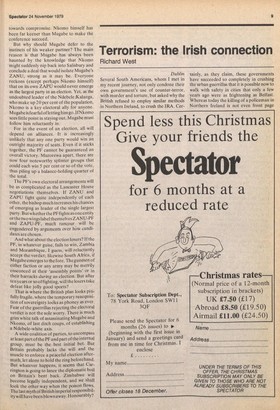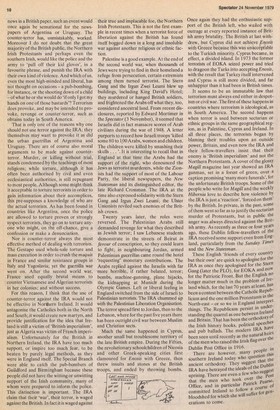Terrorism: the Irish connection
Richard West
Dublin Several South Americans, whom I met in my recent journey, not only condone their own government's use of counter-terror, with murder and torture, but asked why the British refused to employ similar methods • in Northern Ireland, to crush the IRA. Cer tainly, as they claim, .these governments have succeeded so completely in crushing the urban guerrillas that it is possible now to walk with safety in cities that only a few years ago were as frightening as Belfast. Whereas today the killing of a policeman in Northern Ireland is not even front page news in a British paper, such an event would once again be sensational for the newspapers of Argentina or Uruguay. The counter-terror has, unmistakably, worked. Moreover I do not doubt that the great majority of the British public, the Northern Irish Protestants and perhaps even the southern Irish, would like the police and the army to 'pull off their kid gloves', in a favourite phrase, and punish the IRA with their own kind of violence. And which of us, even the most high-minded and liberal, has not thought on occasions — a pub-bombing, for instance, or the shooting down of a child —of what he or she would do 'if only 1 got my hands on one' of those bastards'? Terrorism does provoke, and may be intended to provoke, revenge or counter-terror, such as obtains today in South America.
That is only one of the reasons why one should not use terror against the IRA: they themselves may want to provoke it as did the urban guerrillas of Argentina and, Uruguay. There are of course also moral arguments to be made against counterterror. Murder, or killing without trial, stands condemned by the teachings of most religions; while torture, although it has often been authorised by civil and even ecclesiastical authorities, is still repugnant to most people. Although some might think it acceptable to torture terrorists in order to gain information about their accomplices, this pre-supposes a knowledge of who are the actual terrorists. As has been found in countries like Argentina, once the police are allowed to torture proven or strongly syspect terrorists, they go on to torture anyone who might, on the off-chance, give a confession or make a denunciation.
Nor is counter-terror always the most effective method of dealing with terrorists. The Gestapo used whole-sale torture and mass execution in order to crush the maquiS in France and similar resistance groups in Italy and Yugoslavia; yet the guerrilla war went on. After the second world war, France used equally brutal means to counter Vietnamese and Algerian terrorists in her colonies; and without success.
For this reason, I think that the use of counter-terror against the IRA would not be effective in Norithern Ireland. It would antagonise the Catholics both in the North and South; it would create new martyrs, and provide justification for the idea that Ireland is still a victim of 'British imperialism', just as Algeria was victim of French imperialism. Unfortunately for the British in Northern Ireland, the IRA have too much support, or inspire too much fear, to be beaten by purely legal methods, as they were in England itself. The Special Branch were able to catch the pub-bombers of Guildford and Birmingham because these people did not have the witting or unwitting support of the Irish community, many of whom were prepared to inform the police. This distinction is important. The IRA claim that their 'war', their terror, is waged against the British. In fact it is waged against their true and implacable foe, the Northern Irish Protestants. This is not the first example in recent times when a terrorist force of liberation against the British has found itself bogged down in a long and insoluble war against another religious or ethnic faction.
Palestine is a good example. At the end of the second world war, when thousands of Jews were trying to find in their homeland a refuge from persecution, certain extremists among them turned terrorist. The Stern Gang and the Irgun Zwei Leumi blew up buildings, including King David's Hotel; they murdered or hanged British soldiers, and frightened the Arabs off what they, too, considered ancestral land. From recent disclosures, reported by Edward Mortimer in the Spectator (3 November), it seemed that Israelis did in fact massacre scores of Arab civilians during the war of 1948. A letter purports to record how Israeli troops 'killed some 80 to 190 Arabs, women and children. The children were killed by smashing their skulls . . . °. It is interesting to recall that in England at that time the Arabs had the support of the right, who denounced the Jews as terrorist murderers, while the Zion ists had the support of most of the Labour Party, the liberal newspapers, the New Statesman and its distinguished editor, the late Richard Crossman. The IRA at the time also expressed solidarity with the Stern Gang and Irgun Zwei Leumi; the Ulster Unionists reviled such enemies of the British crown.
Twenty years later, the roles were reversed. The Palestinian Arabs still demanded revenge for what they described as Jewish terror; I saw Lebanese students demonstrate in the streets of Beirut in favour of conscription, so they could learn to fight; in neighbouring Jordan, armed Palestinian guerrillas came round the hotel 'requesting' monetary contributions. The Arabs replied against the Israelis with far more horrible, if rather belated, terror; bombs, machine-gunning, plane hijacks, the kidnapping at Munich, during the Olympic Games. Left or liberal feeling in England switched from the side of Israeli to Palestinian terrorists. The IRA chummed up with the Palestinian Liberation Organisation. The terror spread first to Jordan, then to the Lebanon, where for the past five years there has been outright civil war between Muslim and Christian sects.
Much the same happened in Cyprus, another small but troublesome territory of the late British empire. During the Fifties, the revolutionary schoolchildren of Nicosia and other Greek-speaking cities first clamoured for Enosis with Greece, then threw insults and stones at the British troops, and ended by throwing bombs. Once again they had the enthusiastic support of the British left, who wailed with outrage at every reported instance of British army brutality. The British at last withdrew, but Cyprus did not achieve Enosis with Greece because this was unacceptable to the Turkish minority. Cyprus became, in effect, a divided island. In 1973 the former terrorists of EOICA seized power and tried to dragoon the Turks into accepting Enosis, with the result that Turkey itself intervened and Cyprus is still more divided, and far unhappier than it had been in British times.
It seems to be an immutable law that terrorism must always end either in despotism or civil war. The first of these happens in countries where terrorism is ideological, as in South America. The second happens when terror is used between sectarian or ethnic groups in the same geographical region, as in Palestine, Cyprus and Ireland. in all three places, the terrorists began by blaming their troubles upon an outside power, Britain, and even now the IRA and their fellow-travellers insist that their enemy is 'British imperialism' and not the Northern Protestants. A cover of the glossy Magill magazine last year showed an IRA gunman, set in a forest of green, over a caption promising 'many more funerals', for the unfortunate British troops. Some of the people who write for Magill and the weekly Hibernia love to describe how violence by the IRA is just a 'reaction', 'forced on them' • by the British. In private, in the past, some of them went so far as to justify the sectarian murder of Protestants, but in public the anger was always directed against the British army. As recently as three or four years ago, these Dublin fellow-travellers of the IRA received some support even from England, particularly from the Sunday Times and the New Statesman. These English 'friends of every country but their own' are quick to apologise for the IRA as once they apologised for the Stern Gang (later the PLO), for EOKA and now for the Patriotic Front. But the English no longer matter much in the problem of Ireland which, for the last 70 years at least, has been a contest between the Catholic Republicans and the one million Protestants in the North-east — or so we in England interpret things. The Republicans persist in understanding the quarrel as one between Irelanc_ and Britain. That has been the orthodoxy of the Irish history books, political speeches and pub ballads. The modern IRA have been seen until recently as the natural heirs of the men who raised the Irish flag over the Dublin Post Office in 1916. le There are however, many Pe°11 in southern Ireland today who questionthis ancient orthodoxy. They suggest that he .n IRA have betrayed the ideals of the Dubil uprising. There are even a few who suggest that the men who took over the post Office, and in particular Patrick ethis ancient Ireland to follow a course er for erations to come. esaer soe f, Ireland to follow a course bloodshed for which she will suff gn er for erations to come. esaer soe f,



































 Previous page
Previous page